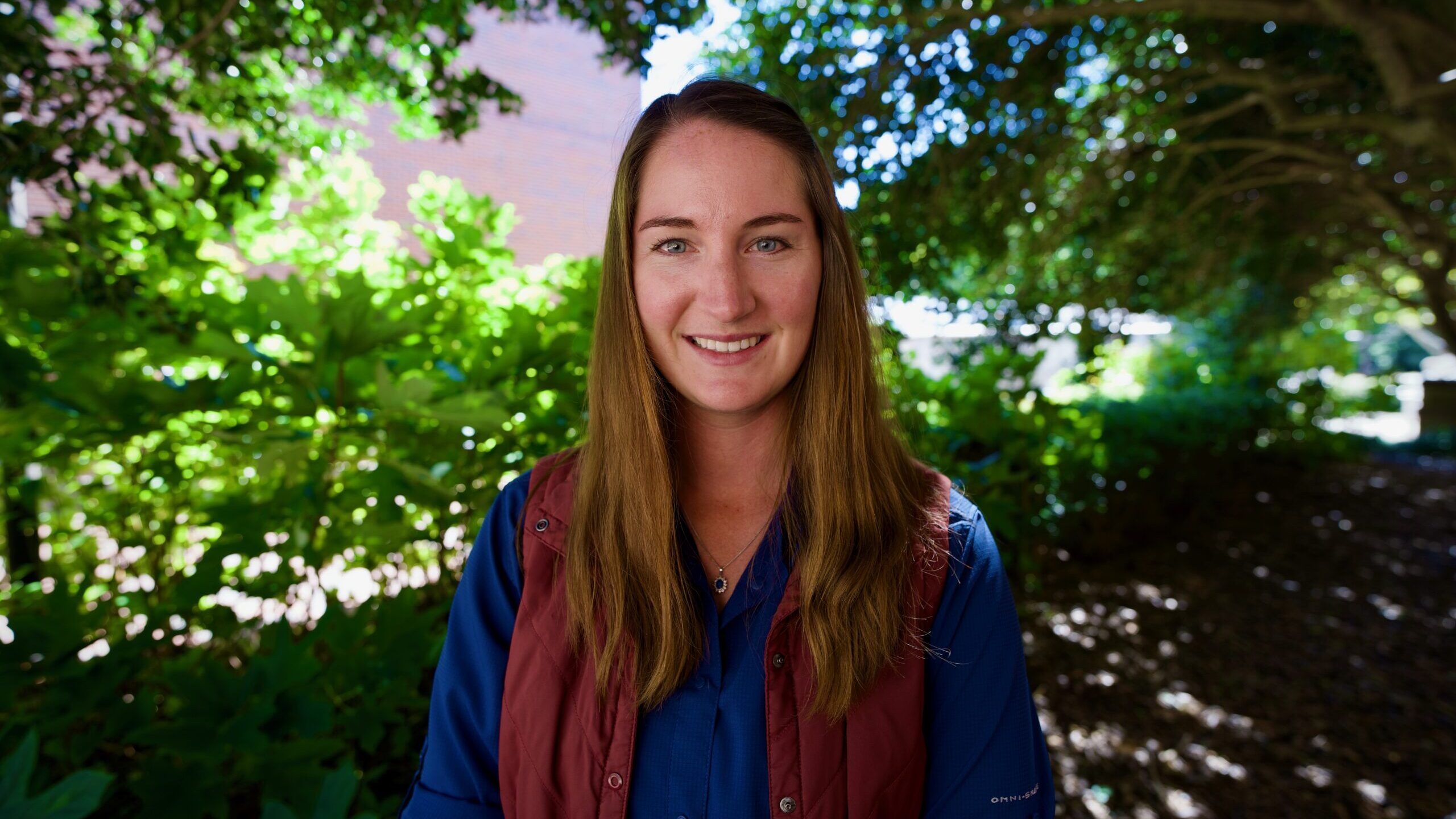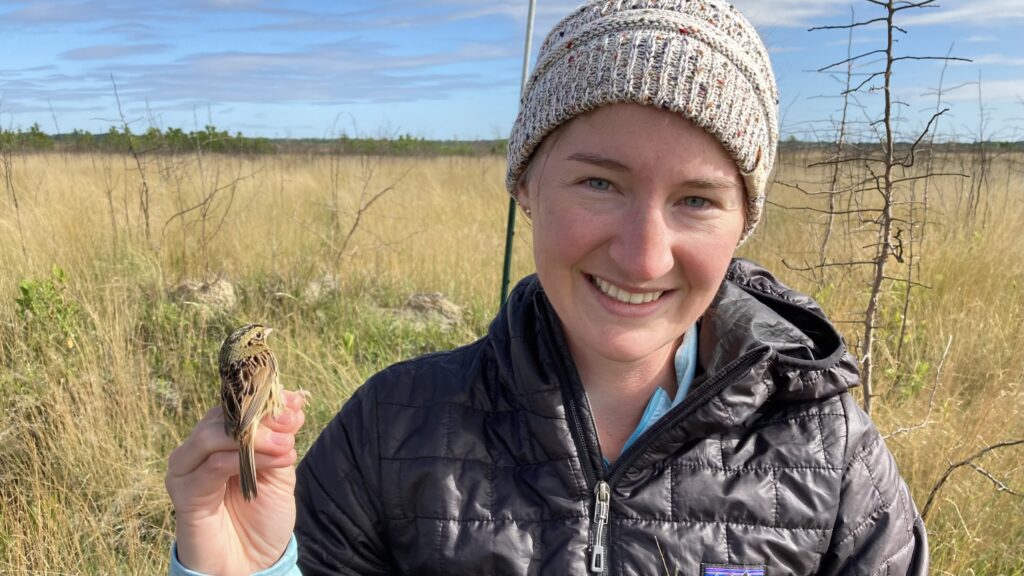Researcher Spotlight – Emily Nastase

2022-23 Global Change Fellow
PhD Student, Department of Applied Ecology
Advisor: Dr. Jaime Collazo
Every year the Southeast Climate Adaptation Science Center funds a multi-disciplinary cohort of Global Change Fellows representing colleges across NC State University. Here are some highlights about 2022-23 Fellow, Emily Nastase and the applied research she’s conducting.
About You
What do you study?
For my PhD research, I am studying the ecology and genetics of a declining grassland songbird, the Henslow’s Sparrow. There is only one known breeding population of Henslow’s Sparrows in North Carolina, thus the species is considered of high management priority to the state. I am addressing research objectives that will help characterize the current status of the Henslow’s Sparrow population in North Carolina, quantify their response to fire management, and determine the genetic distinctiveness and diversity of this population.
What influenced you to go into this field of study?
It was on a whim in my senior year of undergrad that I applied to participate in a study abroad trip to Panama. The goal of the trip was to learn about climate impacts on migratory songbirds and wetland habitats in the tropics—an area of study that was far from what I was currently studying at the time (fine art!) To my amazement, I was accepted to the program and soon after I found myself on a flight to Panama. That trip, led by my ornithology professor, Dr. Lesley Bullock, changed the course of my career. From then on, I knew that I wanted to study ecology and climate change in my career.
What are three words your friends would use to describe you?
Ambitious. I’ve always been the kind of person that seeks out new or worthwhile opportunities. Learning and working give me a sense of accomplishment, and at times I find it difficult to slow down. When I sit still for too long (figuratively speaking), I find myself getting restless and looking down the line at what is coming next.
Problem-solver. Ever since I was young, I’ve loved solving puzzles and riddles. As I’ve gotten older, this has translated into finding the best statistical solution to some problem or optimizing a species management plan. It’s thrilling to be faced with unique challenges and fun to solve them!
Adventurous. I absolutely love traveling, backpacking, climbing, kayaking—you name it. One of my favorite things to do is to have new experiences, whether it be hiking a new trail or cooking a recipe for the first time. One of my more notable adventures was when I went skydiving for my 24th birthday. So cool!
About Your Research

How can your research be used to inform management decisions?
At present, there are many “unknowns” about the Henslow’s Sparrow’s life cycle, habitat use, and population ecology. The findings of this research will directly feed into a species status assessment and a population viability assessment for the Henslow’s Sparrow in North Carolina. These tools will be used to guide management of the species and its breeding habitats within the state.
Who will benefit from your research?
The Henslow’s Sparrows! Beyond the sparrows, this research will benefit land managers both in North Carolina and in other states that have breeding populations of Henslow’s. On a personal note, this research has benefitted me immensely. Between the diversity of research objectives, the spring fieldwork, and the analytical work involved, I’ve learned so much since I started my PhD program.
What is the most important thing that you’ve learned?
I think the most important thing I’ve learned while in this program is to not underestimate my own abilities. When I began this project back in 2020, I had no idea that I would be capable of accomplishing everything that I have so far. I have successfully led field crews to collect data, I have learned how to conduct and interpret statistical analyses, and I have coded some pretty cool models in R. I’m very proud to have come this far in three years.
About Your Global Change Fellow Experience
How do you expect the SE CASC Global Change Fellows Program to impact you and your work?
Though I am only halfway through the Global Change Fellows program, I can already see the impact it’s having on me and my career. The suite of unique topics we’ve discussed so far and the interactions I’ve had among Fellows and professionals in the field has helped me form a new perspective on climate change impacts to communities and habitats. This new perspective will benefit me long after my time as a Global Change Fellow has concluded.
What has been the most rewarding part or your favorite part of being a SE CASC Global Change Fellow?
I think the most rewarding part of being a SE CASC Global Change Fellow was the time I spent at the field intensive with the other fellows in Beaufort, North Carolina. We spent a week visiting various coastal habitats and learning about the climate impacts to the region. In addition to the unique, place-based learning that week, we had the opportunity to build a sense of camaraderie and develop meaningful friendships. This is something that doesn’t happen often in a classroom setting.
What advice would you give to an incoming Global Change Fellow to get the most out of their experience?
Be an active participant in the program. Show up. Ask questions. Listen to lectures. Be social with your peers. I know how difficult it can be to engage in work or events that are beyond the minimum required of you—we’re always slammed with schoolwork, fieldwork, and our own personal lives. Yes, you can skirt by with minimal effort and still have a nice line item on your resume, but you’ll only get out what you put into the program. I believe we owe it to our peers, the SE CASC, and ourselves to make the effort to participate and learn as much as possible during this fellowship.
- Categories:
